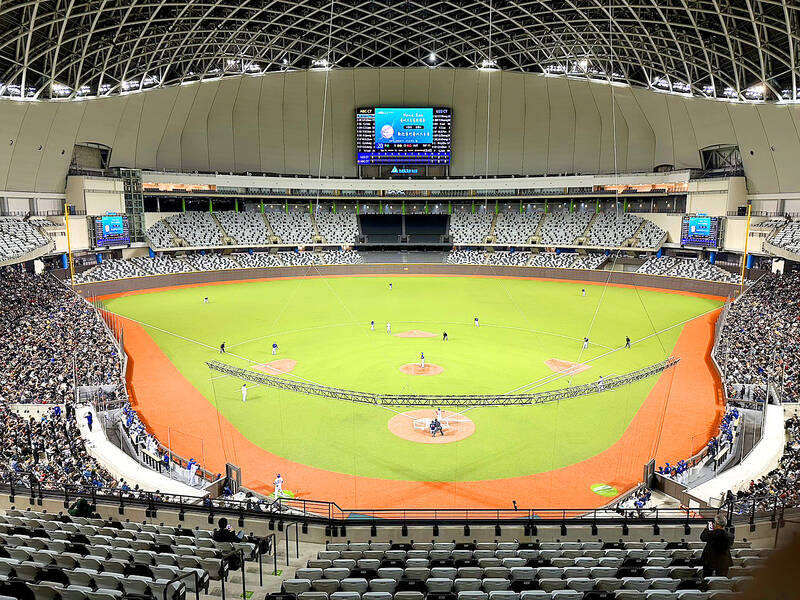Farglory Group (遠雄集團) and the Taipei City Government yesterday held the first public event at the Taipei Dome, inviting 13,000 people to watch a free baseball game to test seating, crowd flow and traffic controls at the facility.
The stadium, which has a capacity of about 40,000 people and held a closed-door test game on Tuesday, yesterday hosted an exhibition game between the nation’s Asian Baseball Championship team and U-23 Baseball World Cup training team.
Contractor Farglory said it would collect opinions from coaches, players and attendees after the game to help improve the stadium.

Photo: CNA
The Taipei City Government in 2006 signed a build-operate-transfer contract with Farglory to construct the Taipei Dome, but controversies concerning the public safety of the stadium and shopping mall complex caused work on the project to be halted several times over the past eight years.
People were allowed to enter the stadium at 11am for yesterday’s 1pm game. Staff wearing vests guided crowds at exits four and five of the nearby Sun Yat-sen Memorial Hall MRT Station, as well as in the underground corridor that runs from the station to the dome.
While many attendees praised the facility for its aesthetics and comfort, some complained that the markings and signage for directions were unclear.
Taipei Mayor Chiang Wan-an (蔣萬安) said the city government would continue to gather opinions on all aspects of the facility, such as direction markings, crowd guidance, seating, and broadcast and stadium screen quality.
He said the traffic and crowd flow before the game was smooth, adding that most of the people arrived by bus or the MRT rail system.
The Taipei Department of Transportation said that the traffic flow around the dome was normal when people were allowed to enter from 11am, and when the crowd began to leave at about 4:22pm.
It said that 969 vehicles and 1,116 scooter parking spaces in the dome were opened for the game, but they were not filled up, as more than 80 percent of the audience arrived on foot or by public transportation.

A car bomb killed a senior Russian general in southern Moscow yesterday morning, the latest high-profile army figure to be blown up in a blast that came just hours after Russian and Ukrainian delegates held separate talks in Miami on a plan to end the war. Kyiv has not commented on the incident, but Russian investigators said they were probing whether the blast was “linked” to “Ukrainian special forces.” The attack was similar to other assassinations of generals and pro-war figures that have either been claimed, or are widely believed to have been orchestrated, by Ukraine. Russian Lieutenant General Fanil Sarvarov, 56, head

SAFETY FIRST: Double the number of police were deployed at the Taipei Marathon, while other cities released plans to bolster public event safety Authorities across Taiwan have stepped up security measures ahead of Christmas and New Year events, following a knife and smoke bomb attack in Taipei on Friday that left four people dead and 11 injured. In a bid to prevent potential copycat incidents, police deployments have been expanded for large gatherings, transport hubs, and other crowded public spaces, according to official statements from police and city authorities. Taipei Mayor Chiang Wan-an (蔣萬安) said the city has “comprehensively raised security readiness” in crowded areas, increased police deployments with armed officers, and intensified patrols during weekends and nighttime hours. For large-scale events, security checkpoints and explosives

PUBLIC SAFETY: The premier said that security would be tightened in transport hubs, while President Lai commended the public for their bravery The government is to deploy more police, including rapid response units, in crowded public areas to ensure a swift response to any threats, President William Lai (賴清德) said yesterday after a knife attack killed three people and injured 11 in Taipei the previous day. Lai made the remarks following a briefing by the National Police Agency on the progress of the investigation, saying that the attack underscored the importance of cooperation in public security between the central and local governments. The attack unfolded in the early evening on Friday around Taipei Main Station’s M7 exit and later near the Taipei MRT’s Zhongshan

REBUFFED: In response to Chinese criticism over recent arms sales, Washington urged Beijing to engage in meaningful dialogue instead of threats and intimidation Washington’s long-term commitment to Taiwan would not change, the US Department of State said yesterday, urging Beijing to stop pressuring Taiwan and engage in meaningful bilateral dialogues. The remarks came in response to a backlash from Beijing about Washington’s latest approval of arms sales to Taiwan. The US Defense Security Cooperation Agency said in a statement on Wednesday that the Taipei Economic and Cultural Representative Office in the US has asked to purchase an arms package, including Tactical Mission Network Software; AH-1W helicopter spare and repair parts; M109A7 self-propelled howitzers; HIMARS long range precision strike systems; tube-launched, optically tracked, wire-guided missiles; Javelin